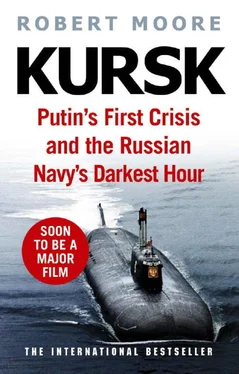But eighteen years after the Kursk disaster, the danger signals for Putin are re-emerging on multiple fronts. Critically, social media networks threaten his ability to control information, as was clear from widely shared videos of the protests that erupted after the Kemerovo fire; frustration with nepotism and corruption is proving difficult to contain; and Putin’s ability to keep ahead of events is being severely tested. The Kremlin faces new threats at home and abroad. The lessons of the Kursk have been invaluable to Putin in handling multiple crises throughout his presidency, but they are now of rapidly diminishing returns.
The young sailors who were assembled in the 9th Compartment on 12 August cannot have been thinking of their new leader or of the politics of their nation. The twenty-three survivors were facing a cascade of crises in a profoundly hostile environment. They were in one of the most perilous situations imaginable: trapped in a disabled submarine on the ocean floor with oxygen levels constantly falling – and carbon dioxide insidiously rising – with every breath they took.
Dmitri Kolesnikov and the twenty-two men now under his command had to make calculations and decisions with only fragments of information. They had no way of knowing what had happened to their friends and crew-mates in the forward compartments of the submarine. They couldn’t be certain of the state of the hatches above them, the integrity of the hull, or how quickly a rescue mission would be mounted. Above all, they could not possibly have known that the Russian state had other priorities than their survival.
120 miles to the south-west of the fatally wounded submarine, Olga Kolesnikov, her heart breaking with anguish and uncertainty, was waiting for news of her husband and the rest of the crew. But she kept her faith: the sailors were so strong and resourceful, their submarine was the pride of Russia, and the world was racing to help. Surely Dmitri and his shipmates would survive.
SATURDAY, 12 AUGUST 2000
Aboard the USS Memphis in the Southern Barents Sea
Captain Mark Breor listened closely to the flow of reports coming from the sonar and radio rooms. In the claustrophobic confines of the ship’s attack centre, the exchange of information was delivered in clipped and precise tones. Drawn, pale faces stared intently at the sensors and computer screens. After nearly two months of demanding duty in the Barents Sea, the tension was running high. The younger crew members were being taken to the very limits of their training, and beyond. Although the veterans’ nerves were steadier, they also felt the pressure of knowing there was no scope for a single error or misjudgement.
Breor focused on the ever-shifting tactical picture on the surface. Keeping up with the movements of the Russian ships and submarines was like playing a high-stakes game of three-dimensional chess. The warships were never static, and the movement of each had to be meticulously plotted. He was determined to keep the USS Memphis at periscope depth for as long as he dared. There might be moments when he had to go deep to avoid detection, but very little information can be gleaned without a periscope or mast out of the water.
Gliding just 18 metres below the ocean surface, the submarine was intercepting Russian naval communications. The mission represented the perfect marriage of the sailor and the spy – navigating the submarine through hostile waters to collect high-grade naval intelligence. Despite all the technology contained within the hull of the Memphis , there is something very demanding, very human about driving a submarine into the shallow Barents Sea. Tactics and cunning, and a little artistry, are just as important as all the electronics.
Summer operations are complex missions, as oceanographic conditions constantly change. The Arctic Ocean, broiling and angry for the rest of the year, is calm. For a submarine on covert patrol, that brings hazards – benign seas combined with long hours of daylight mean a periscope can be more easily spotted by Russian lookouts. But Western submarine commanders like Breor have been taught how to use the summer months to their advantage. One of the tricks is to find where the Arctic ice is melting into the open sea. The fresh water flowing into the ocean creates different layers of salinity and temperature, confusing Russian sonar operators and providing Western submarines with an ideal hiding place.
Like the other officers on board, Breor viewed the Northern Run off the Kola Peninsula as the toughest and most exhilarating military patrol in the world. Nothing rivalled the challenge of a clandestine operation off Russia’s Arctic coast. A single navigational blunder or tactical miscalculation could lead to collision or detection, either of which could provoke an international incident. But if all went well, the Memphis would leave no footprints on this invisible front line, and the Russians would never even glimpse the sub’s electronic shadow, despite her length of 110 metres and displacement of 7,000 tons.
For five decades, the frigid waters of the Barents Sea have played silent witness to the most classified espionage campaign in naval history. A generation of British and American submariners have monitored and tracked Russian ships as they left their lairs on the desolate Kola Peninsula and headed out on patrol. Over time, a bonanza of intelligence has been gathered on the capabilities and vulnerabilities of Russian submarines. The icy Barents Sea is still the red-hot centre of operations in the lingering Cold War, the closest experience to combat for these American sailors.
On this long summer mission, Captain Breor was living up to his reputation as a commander who stayed calm under pressure. After eight adrenalin-driven weeks on patrol, he had never once shouted at a crew member, let alone lost his temper. The younger officers watched him closely and admired what they saw. Twenty years earlier, he had won the Citadel Sword as the outstanding student in his naval course, and as captain of the Memphis he had just clinched the prestigious Battle Efficiency award for the performance of the submarine. But accolades don’t count on a patrol like this, and a career can be lost in a moment’s complacency. The lives of 130 American seamen, and the fate of a $2 billion boat, depended on Breor and his executive officer making the right judgements every hour of every day.
Two months earlier, in the second week of June, just before the Memphis slipped out of her home port of New London, Connecticut, the top-secret operational orders for the patrol had been hand-delivered by a courier from the Atlantic Fleet commander. Ever since, the document had been locked in Breor’s personal safe. The key mission priority was detecting and monitoring the movement of the Russian nuclear ballistic-missile submarines – the giant boats known in US Navy slang as ‘boomers’. They can be tracked by their flow noise, the sound of eddies of waters sliding unevenly off the tiling of the hulls, disturbing the surrounding ocean. The sound waves from the cavitation of the propellers and the vibrations of machinery on the subs also betray them.
Tracking these ballistic-missile boats – or SSBNs, as they are properly classified – is of huge importance to the US Navy. They comprise Russia’s ‘strategic reserve’ – Moscow’s guarantee that in the event of a nuclear exchange it retains the retaliatory capability to destroy the United States. Should an all-out war erupt, targeting and destroying Russia’s ballistic nuclear submarines would be the only way of saving the United States from annihilation.
Breor’s mission orders did not stop there. Other objectives were carefully ‘stacked’ by priority. In addition to keeping watch for a Russian boomer moving out on patrol, the Memphis was ordered to monitor the regular summer exercise in the Barents by the Northern Fleet. By the standard of recent years, the manoeuvres this summer were on an impressive scale – with dozens of surface warships and, according to the sonar operators, at least four submarines.
Читать дальше












